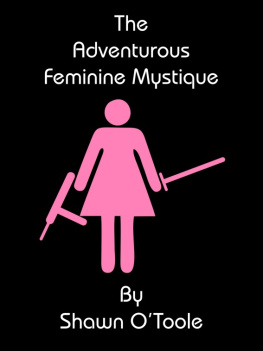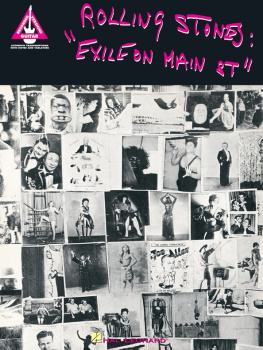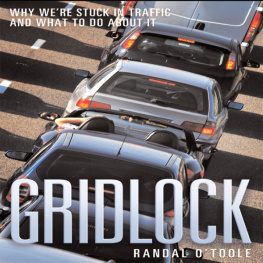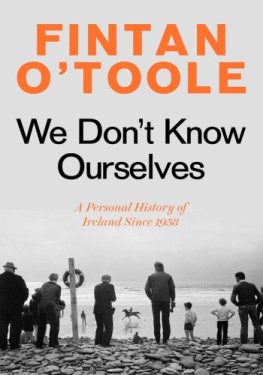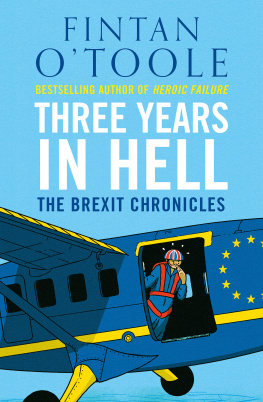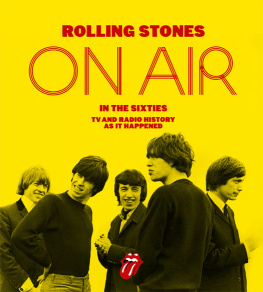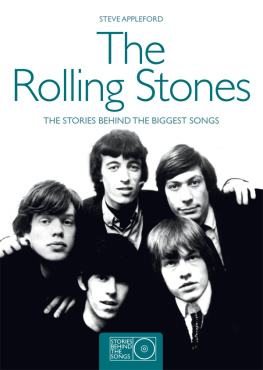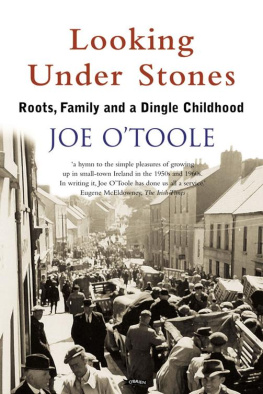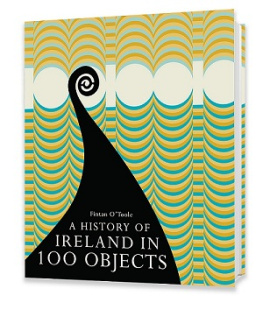
Fair Day on Main Street, Dingle.
To Joan, a wonderful partner.
I have many people to thank:
Teresa for her motherly, non-judgemental eye over five decades.
Max & Phil Webster for their supportive encouragement.
Four tremendous sisters, Mary Sabrina, Anita, Phyllis and Grace, for not panicking about this. Phyl Moriarty for her help, stories and photographs; Ita Moriarty for her openness and courage.
Patty Atty Moriarty for uninhibited information on the early Moriartys; John Moriarty and John Benny Moriarty; Hanora Moriarty. Mollie, Fergus and Karl OFlaherty for their accuracy; Mazzarella and Norella for their story.
Peadar and Murielle OToole, Lettermore; Lena OToole, truly a fount of knowledge. Oliver and Annie OToole; Clare and Geraldine OToole.
Toms, Sle and the Tourmakeady OTooles for completing the family tree.
Michel Mrin for his stories.
Fr Kieran OShea.
Pat Neligan, Donal Loingsigh, Thomas Lyne for remembering.
Austin Corcoran for his research.
Michel Cuaig, Cill Chiarin, don taighde itiil.
Ciarn Cleary, graduate of Barrys forge, for describing another Dingle.
Mary Webb for her effective editing, positive advice and sheer professionalism.
This is a story. It is neither a social history, a local history nor a family history.
Mentally revisiting, questioning, querying and trying to understand anew things which were the norm growing up has been a real challenge. The research, the talking and the writing were thrilling for me. I have learned more and come to understand more about myself and my background during the writing of this book than at any other time in my life. The uniqueness of a Dingle childhood and the constant provocation and catalyst of interesting relations, friends and neighbours re-emerged.
I have also been awestruck in admiration of the zest for life among my OToole and Moriarty ancestors, how they dealt with hardship, tragedy, success and change, and most of all how they could still laugh at themselves and live life to the fullest. The more I got to know of them, the more interesting I found them.
Surprisingly, I have found that all those things that I enjoy in my own life, including teaching, politics, writing, boating, haggling and a love of islands, are all there within the clan experience. I have also grown to a fuller appreciation of how those life experiences moulded me.
No one contributed more to the way I turned out than my father, Myko, whose influence and open, tolerant philosophy continues to give me a sense of direction. I hope that this book is a testament to his tutelage more than any other. It may be a strange thing to say about ones father, but it was a great privilege to have known him and shared in his constant optimism and ever-ready good humour. His great lesson was that every day is worth living, and life, with all its challenges, is also an entertainment.
For me this has been an exhilarating and fascinating voyage through my gene pool. My hope is that the reader, as a fellow traveller, will share some sadness, joy and discovery with me and that my account might also induce the odd smile.
Joe OToole, September 2003.
CONTENTS
The Moriartys
Daddy Tom: Great-great-grandfather
Old Johnny: Great-grandfather
Sen the Grove: Grandfather
Born 1885. Married Bridgy Fitzgerald, 1913.
Children: Patrick (Patty Atty), Mollie (married Paguine), John (Foxy John), Thomas, Teresa (my mother), Jonathan (Jonty), Phyl, Ita, Benny, and Jimmy
The OTooles
John OToole: Great-great-great-grandfather
John OToole: Great-great-grandfather
Pat (Kruger) OToole: Great-grandfather
Joe OToole: Grandfather (also his brother Henry, my granduncle)
Born 1884. Married Margaret OBoyle, 1905.
Children: Patrick, Mary Clare, Twins Michael (Myko my father) and Jack, and Plunkett
The joining of the clans:
Teresa Moriarty married Myko OToole in 1946
Children: Joseph (b.1947), Mary Sabrina, Anita, Phyllis and Grace
There have been Moriartys in Kerry for as long as history records, but the first one of whom I heard stories was Daddy Tom, my great-great-grandfather. And by all accounts he was not the kind of behavioural role model we would be inclined to hold up to our children. He had a reputation as a bit of a rake; the kind of man a father would be reluctant to leave alone with his daughter.
Daddy Tom married another Moriarty, a distant cousin, thereby reuniting two sides of the family. His wife, Sle g, was from below the hill in Mullach Mhial, a beautiful and remote place tucked in under the Conor Pass, on the Cloghane side. The Mullach Mhial people had a centuries-old track worn into Dingle, across the hill, through Camaois and down by the Glens. Daddy Tom called into Mullach Mhial regularly enough. It was always expected that he would marry Mary, the eldest girl; they were promised to each other. But Toms eyes wandered. He was distracted by the younger Sle, and soon it was himself and Sle g who were becoming great with each other.
It wasnt a situation approved of by Sles father, who did not trust Tom for either of his daughters: By God but werent we privileged to have had his company again today! He is too fond of the drink and mad for the other thing, that fella. Im telling you, youd be better off keeping far away from him. Young ODonnell is far steadier. Tom Moriarty might be clan but he has a dangerous, wild streak in him.
Sle was well aware that James ODonnell was steadier. Wasnt he a neighbour and didnt she know him all her life. When he called to the house you wouldnt notice the difference; he was just like the rest of her family. And he would marry her in the morning. Everyone expected it. James was safe, secure and dull.
Tom Moriarty was a rogue. He plmsed her mother, drank with her brothers, challenged her father, laughed at the world and worried little. He was exciting. Never a ptrn day or fair did he miss and he would never leave a ball before morning. And she had heard about him and the women. But she wanted him around and wanted to be with him.
One fine summers day, when it was time for Tom to leave, Sle walked with him up the path to the top of the hill where, no doubt, the stunning views of the north and south sides of the Peninsula were the last things on the minds of two healthy, handsome youngsters. As Breandy Begley put it, They went at it so hard that Tom left the print of Sles arse on the side of the track!
Nature took its course, and with a baby on the way the couple did what they were expected to do and got married. And as for a honeymoon, a learned local historian told me once, What honeymoon are you talking about? In those days the honeymoon after the wedding was a day in town and a night in bed. While the young lovers settled in to the married state, it is said that Daddy Tom did not let marriage completely change his rakish ways. Seven or eight at home and a few more around the parish, was his answer to an enquiry as to the size of his family. Tom took to heart the great biblical imperative Go forth and multiply and made it a personal mission.




